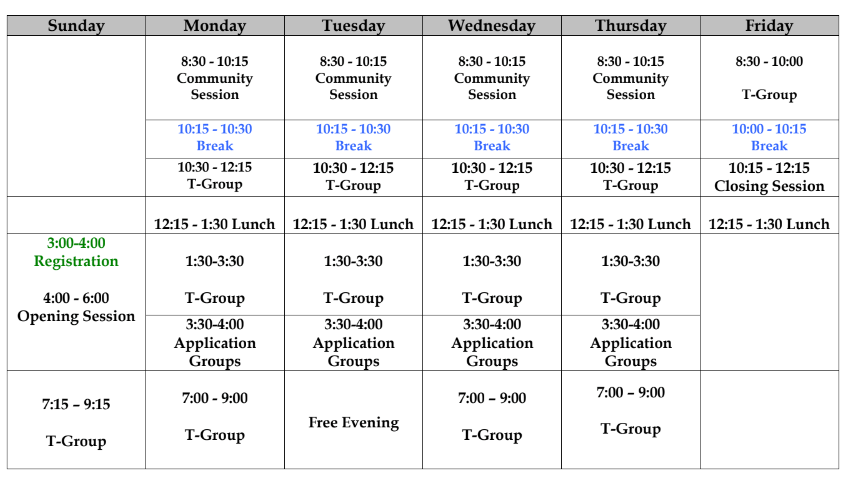Interpersonal Relations
The Human Interaction Lab®
NTL Institute: The Gift You Give Yourself
Human Interaction Laboratory®
Level up your interpersonal relationships
Upcoming Courses:
For online virtual HI Labs, the tuition fee is $1,600.
The Virtual HI Lab schedules are:
- January 23 - 30, 2026
Pacific Standard Time - April 24 - May 1, 2026
Central European Time - August 28 - September 4, 2026
Eastern Daylight Time
Face-to-Face Offerings - Held at The Maritime Conference Center, in Baltimore, MD, unless otherwise noted. The Maritime is also the overnight campus and reservations will be made in the participants name, prior to the start of the Lab.
The tuition fee is $2,990
Please note tuition does not include room and board with the campus
- March 15 - 20, 2026
- June 7 - 12, 2026
- July 12 - 17, 2026
- October 25 - 30, 2026
- December 6 - 11, 2026
*Schedule subject to change
Participants are responsible for accommodations and incidentals.
All fees must be paid in full prior to commencement of the program.
Cancellations made within 30 days of the event date are non-refundable. This policy is in place due to the proximity of the event, which limits our ability to rebook the space and cover related costs.


Your skill and effectiveness as a leader or group member depends upon the quality of your human interactions. Give yourself the tools you need to excel.
Join a wide variety of people from different backgrounds who come together in a supportive learning environment to become adept at relationships that work!
Learn from others' perspectives and experience to help you navigate your own challenging human interaction and relationship situations. Join us. Register today!
The elements of the Human Interaction Laboratory®(HI Lab) include:
-
- Self-Awareness
-
- Emotional Intelligence Diversity, Equity, Inclusion, and Belonging
-
- Group Dynamics
-
- Authenticity in Relationships
-
- Deep Listening
-
- Giving and Receiving Feedback Effectively
-
- Leadership Effectiveness
-
- Experiential Methodology of T-Group™ Work
-
- Understanding use of self and our impact on others
This signature program of NTL Institute develops the key areas of personal and leadership effectiveness: self-awareness, interpersonal skills and ability to observe and be facilitative in a group. In real-time situations, you will learn how your own behavior impacts others. You will learn to give and receive feedback in a way that creates connections and learning for others and yourself. Through this process you will learn to make the changes you need to make to achieve the results you desire.
Past participants report that after the HI Lab® they are able to communicate more effectively with co-workers, colleagues, clients, and family members and that this learning "sticks" over time.
The HI Lab® of today is as impactful- even life-changing - as it has evolved over 60 years, supported by conceptual and in-the-moment semi-structured learning sessions. It also uses the principles of emotional intelligence - the ability to identify emotions (in both yourself and others) - to realize the powerful effects of those emotions, and to apply that information to guide behavior.
The core methodology for NTL's HI Lab® is the T-Group™, or Training Group, which is a type of experience-based learning in which participants work together in a small group of 8-14 people, over an extended period. Learning comes through analysis of their own experiences and interactions, including feelings, reactions, perceptions, and behavior. T-Group™ provides a setting in which people are encouraged to experiment with new behaviors, examine their experiences in light of feedback from others, and consider what range of behavior changes to consider.
Underlying Assumptions
Underlying the T-Group™ are the following assumptions about the nature of the process which distinguish T-Group™ from other more traditional models of learning:
-
- LEARNING RESPONSIBILITY. Participants take responsibility for their own learning as well as contributing to others' learning. What people learn depends upon their own style, readiness, and the relationship they develop with other members of the group.
-
- AUTHENTIC RELATIONSHIPS and LEARNING. People are most free to learn when they establish authentic relationships in which they can be open, honest, and direct with one another so that they are communicating what they are actually feeling rather than masking their feelings.
-
- Many people report that they try out behavior in the T-Group™ that they have never tried before. This experimentation can enlarge their view of their own potential and competence and provide the basis for continuing experimentation.
-
- SKILL ACQUISITION and BEHAVIOR CHANGE. The development of new skills in working with people is maximized as participants examine the basic values underlying their behavior, learn and apply appropriate concepts and theory, practice new behavior, and obtain feedback on the degree to which the behavior produces the intended impact.
-
- STAFF ROLE: The staff person's role is to facilitate the group in creating a climate supportive of learning where the desired learning process and outcomes are actualized. Diverse staff teams are drawn from NTL members with training and expertise in this area.
